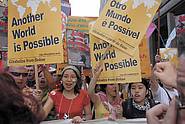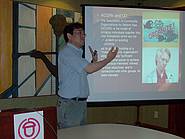Your cart is currently empty!
Category: Latest
The latest news ACORN International!
-

ACORN International expands organizing expertise abroad
 ACORN International was formed to share U.S. members’ grassroots organizing experiences with families and friends in their home countries and to improve the lives of people around the world.
ACORN International was formed to share U.S. members’ grassroots organizing experiences with families and friends in their home countries and to improve the lives of people around the world. Because low-income workers are often forced to migrate for work opportunities to support their families, many have connections in other countries. Corporations also cross borders in search of cheaper workforces and more lenient government policies. For this reason, U.S. ACORN members want to share their successful strategies, fighting exploitative corporations and abusive economic policies.
ACORN has expanded throughout the Americas and to India, defending citizens and workers suffering from globalization in the 21st century. Corporations often rely on the separation between nations to take advantage of workers despite the similarity of their issues. ACORN focuses on the challenges faced by all low-income families, regardless of nationality.
ACORN’s history began 38 years ago in Little Rock, Ark., in the wake of the U.S. civil rights and social movements of the 1970s. Now, ACORN takes the wealth of that experience to the world.
-

ACORN International Latin America Director Shares Experiences with U.S.
 NEW ORLEANS – Ercilia Sahores, Director of ACORN Latin America, said low-income people in Latin America face similar challenges as those in the United States.
NEW ORLEANS – Ercilia Sahores, Director of ACORN Latin America, said low-income people in Latin America face similar challenges as those in the United States. Sahores, who gave a presentation at ACORN’s national headquarters in New Orleans on June 6, said ACORN began organizing internationally because ACORN members in the United States had family members in Latin American countries who were interested in organizing there as well. When ACORN began to organize in the Dominican Republic, people joined in record numbers. Many of the doors organizers knocked on were opened by people who
had heard of ACORN from their family members in New York City and who invited the organizers inside with a warm welcome.
ACORN began its Latin American organizing in Lima, Peru, where low-income people were forced to pay 25 percent of their income in taxes on their homes, plus back taxes. ACORN Peru also organized for potable water, which was made more difficult by the dictatorship ruling the country and the lack of infrastructure.
Peru has produced compelling ACORN leaders, such as Ricardo, who was born blind, and Violeta, whom Ercilia described as one of the 10 reasons she works for ACORN. Violeta started out afraid to speak publicly or with politicians – she spoke Quechua, not Spanish. But through ACORN, she learned that she is just as important as anyone else, and now she can be seen at every protest as the one holding the bullhorn.
As in the U.S., ACORN chooses where to organize based on income and all the problems that go along with having little of it, such as lack of education and poor healthcare. ACORN Latin America is currently organized in Peru, Argentina, Mexico, and the Dominican Republic.
Core issues for ACORN Argentina, Ercilia’s home country, include improving infrastructure, housing and security. They are also working to implement comunas, which would allow low-income people to have a say in their local government. Children are active members of ACORN Argentina as well – they make the signs that people carry during protests.
ACORN Dominican Republic got off to a great start in October of 2007, where just two staff and one head organizer signed up 600 members in their first month. Unfortunately, the Dominican Republic was devastated by Hurricane Noel at the end of that month. ACORN responded to the disaster, shifting the organization’s focus to storm recovery and disaster preparedness.
-

South Korean Organizer Speaks to ACORN about Organizing in Asia
 NEW ORLEANS – What is the meaning of community? With that question, South Korean community organizer Hyo-Woo Na began a presentation to a room full of listeners at ACORN’s headquarters in New Orleans May 16.
NEW ORLEANS – What is the meaning of community? With that question, South Korean community organizer Hyo-Woo Na began a presentation to a room full of listeners at ACORN’s headquarters in New Orleans May 16. In South Korea, the most-wired country in the world and one of Asia’s wealthiest nations, internet communications have expanded the definition of community, especially for younger generations. Na said that the internet has become a useful tool for helping people make initial contact, but after that, face to face meeting is still the best way to proceed.
Community organizing, applying the philosophy of Saul Alinsky and other progressive thinkers, began in many Asian countries in the early 1970s, just as it did in the United States. South Korea was first organized in 1968. The Philippines, Indonesia and India were also among the first countries to bring about changes for the poor through grassroots organizing. Countries that are still ruled by brutal dictatorships, such as North Korea and China, are not yet organized.
Wade Rathke, ACORN’s founder, introduced Na and told listeners that Na had been very active in the democracy movement in South Korea. In North Korea, however, Na explained that military rule remains so powerful that very little information gets beyond its borders. Na has had no word from his grandmother in 40 years.
In the early days of community organizing in his home country, Na saw many of his friends go “to jail or to Heaven” in the struggle to bring about democracy in a country that was at that time ruled by a military dictatorship. Now that democracy has been achieved in South Korea, organizers can focus on winning changes for the poor and labor organizing.
In South Korea, community organizations get much of their funding from the Catholic Church. Speaking with ACORN organizers from the United States, they learned about ACORN’s dues-based model and found themselves presented with a challenge: how could they organize without being dependent on existing institutions?
Na experimented with the ACORN approach. He found it difficult to collect dues, especially when he began with a staff of five organizers that after the first week was down to three and a half. But they soon learned some tricks. The apartment buildings where the poor lived were gated and guarded, but entrance could be bought by offering a guard a cigarette or two. Once they were in, people were more interested in speaking with the organizers if they offered a slice of watermelon. Na found that when he came across people who had just one issue they felt passionate about, he found members.
Many South Korean organizers are women. While women and men have equal rights, they tend to fill different roles in the community. South Korea is an industrial country, so most of the men are working in factories outside of the community. Women, on the other hand, spend most of their time in the community, close to their neighbors, so they often have an easier time building a grassroots movement.
Na and his 3.5 organizers knocked on 8,000 doors in two and a half months. Accounting for population differences – South Korea has about one-sixth the population of the United States – the two countries have comparable numbers of organizers – 300 in South Korea; 2,000 in the U.S. The challenge before us all now, Na concluded, is to find a way to work together, to use grassroots organizing to bring about positive change in a global community.
-
About ACORN International
ACORN International is a federation of member-based community organizations that is active in Canada, Peru, Argentina, Mexico, India,Kenya, the Dominican Republic, Honduras, South Korea, Czech Republic and Italy with partners in the Philippines and emerging affiliates inTrinidad & Tobago. The membership currently numbers approximately 55,000 families.
Since its creation it has focused on a wide variety of local campaigns and initiatives, including fighting for potable water, paved roads, schools and parks in San Juan Laragancho in Lima, Peru, working to organize ragpickers and hawkers in India’s mega-slums,[2] and working to raise the standards for tenants in cities across Canada. Much of ACORN International’s work focuses on mega-slums like Dharavi(Mumbai), San Juan Laragancho (Lima), La Matanza (Buenos Aires), Korogocho (Nairobi), the ITO community (Delhi), Col. Ramon Amalia Amador (Tegucigalpa), and Choloma (San Pedro Sula) among others.
